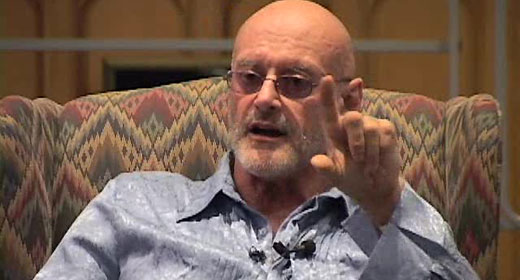by Adam Brady: Turbulence. Chaos. Frustration. These words may describe your days…

You are over-stimulated, frenzied, stressed, exhausted, fatigued, and desperate as you attempt to cope with the challenges of modern life. If this sounds all too familiar, you’re not alone. You live in a culture of compulsive over activity—a society driven to work harder, faster, and longer to accomplish more in less time. To some degree, you may feel as if life has no off switch. The worst part is that you may think that feeling this way is normal.
But you’ve been fooling yourself. The culture of driving ambition and nonstop activity is taking a huge toll on your health, happiness, and overall well-being. While human beings are adaptive and resilient, you are not meant to operate at this nonstop pace. It’s as if you’ve plugged a string of Christmas lights into a nuclear power plant—without a way to regulate and manage the energy coming into the system, you’ll end up fried. Fortunately, there is a way to find the balance you seek: self-care.
Self-Care Definition
Originally a medical concept, self-care refers to consciously taking responsibility for meeting your physical, mental, emotional, and spiritual needs. It’s the deliberate act of spending time engaging in those things and self-care activities that nourish you at all levels of being as well as avoiding situations and experiences that deplete your energy and happiness. Self-care ideas run counter to the cultural norm of self-sacrifice that you may have adopted as your personal ethos. Self-care doesn’t imply selfishness or narcissism; rather, it is both the validation and permission to tend to your needs instead of minimizing or ignoring them.
Qualities of Self-Care
Self-care features the following qualities.
Self-care Is a Paradigm Shift
You have to recognize the worldview of “work harder, longer, and faster” makes you sicker and more miserable. You must understand that ignoring your needs for health and balance is not sustainable and will ultimately cause you to suffer. This can be a radical departure from the conventional model of success you may have come to accept. If you look honestly within, however, you intuitively know the truth behind philosopher and spiritual teacher Jiddu Krishnamurti’s words, “It is no measure of health to be well adjusted to a profoundly sick society.” Only when you shift your perspective will you be able to make self-care a priority.
Self-care Adopts a Holistic Approach
It applies to all levels of life: physical, mental, emotional, and spiritual. It means giving every aspect of your life the attention it deserves to help return to a place of balance and vitality.
Self-care Is Both a Preventive and Recuperative Strategy for Well-being
A common theme in complementary medical modalities such as Ayurveda and traditional Chinese medicine, self-care may take a proactive approach to health and happiness. You may wait to take care of yourself until after something has gone wrong. With self-care, you become participants in your wellness and take responsibility for looking after yourself before exhaustion or illness takes hold. This is also a helpful concept when you need to recover from an injury, illness, overwork, or burnout. It comes with the recognition that in order to return to a life of balance and vitality, you need to make the effort to give yourself what you need to heal.
Self-care Is a Skill and a Discipline
Self-care is not the norm in society; it will feel unnatural to take time for your well-being. It takes practice and commitment to step away when the rest of the world keeps striving and straining. It requires you to reprioritize your life to favor what traditional wisdom traditions teaches matters most—physical and mental health, happiness, and fulfillment at all levels.
Self-care Is a Vitally Important Act of Self-love
While self-care may seem like a fluffy, lazy, or self-indulgent concept, it’s actually an imperative act of giving yourself the gift of unconditional love, acceptance, and nourishment. Self-care is putting your oxygen mask on first before attempting to help another. It’s the recognition that helping others doesn’t have to come at the expense of your happiness and well-being. For in the end, if you don’t take care of yourself, it’s unlikely that someone else is going to do it for you.
6 Tips for Self-Care
What, then, are the tools for practicing self-care? Self-care encompasses many varied disciplines and practices covering several aspects of your life. What follows are six self-care tips that form a comprehensive model of self-care. Consider each as a gateway to the life of balance and wellness you seek.
1. Rest and Recovery
Adequate rest and recovery are the foundation of self-care. In a hyperactive societal/cultural environment, slowing down, unplugging, and getting enough sleep so that you feel rested in the morning is critically important to elevating your mood and emotional well-being. According to the Centers for Disease Control and Prevention (CDC), more than one-third of adults in America don’t get enough sleep. If you’re getting less than the recommended seven hours of sleep per night for adults, take note. An ever-growing body of research reveals the countless healing and restorative effects of quality sleep on your body and mind. Giving yourself the opportunity to get enough sleep will go a long way on your journey to self-care.
In addition to sleep, give your body the gift of restful awareness in the form of meditation. Unlike the restful dullness of sleep, meditation allows your body to be rested while the mind is aware. This is a profoundly restorative state for both your body and mind that can enliven your energy while also helping to regulate your body’s sleep rhythms, allowing for a more restful night’s sleep.
2. Stress Management
Chronic stress is an insidious adversary in your quest for well-being—one that must not be taken lightly. Learning to manage your stress in the fast-paced, frenetic, and turbulent world of day-to-day affairs and routine to-do lists needs to be a high priority on your quest for self-care. Without a sufficient stress management strategy, the effects of fight-or-flight and reactive responses will wreak havoc on your health and peace of mind.
Meditation is the ultimate stress management tool for self-care because it reverses physiological and psychological effects of the stress response. In addition, meditation expands witnessing awareness, allowing you to see yourself through the eyes of compassion. Thus, you can give love and appreciation to the one who often needs it the most—yourself.
In addition to meditation there are several other powerful tools to help mitigate the stress response such as yoga, massage, acupuncture, meridian tapping, and qigong. Regardless of which technique or tool you use, the key is to build a stress management program as a fundamental component of your self-care plan.
3. Work-Life Balance
Another key component of self-care is maintaining a good balance between your work and personal lives. While it may sound easy to draw a clear distinction between the two, due to technological advances and communication tools (such as email, smartphones, and video conferencing), it is difficult to make a clear distinction between work and home. This can lead to a distorted sense of work/life separation. Practicing self-care requires that despite the often-compulsive urge to remain plugged in to work 24-7, you need to make a clean break and reconnect with who you are rather than what you do for a living.
Work-life balance also requires that you know your limitations. Staying late at work to push through a project might seem like the best way to get things done. However, when doing so exhausts you mentally and physically, you’ve reached the point of diminishing returns from which the quality of your work suffers. Making self-care a priority means learning to work smarter, not harder. If you’re not performing in a role that honors the importance of work-life balance, consider looking for other opportunities that place a higher value on the need for personal wellness.
4. Nourishment
In order to care for yourself, you need to take in nourishment. Your body craves wholesome and healthy foods that will give you the abundant energy you need. However, when you forgo self-care, it is often at the expense of your healthy eating habits. You can sometimes eat your feelings or fuel the fight-or-flight response by succumbing to stress eating simple carbohydrates or fats that can lead to greater imbalance. Self-care applies to:
- Consuming nourishing food
- Staying properly hydrated
- Minimizing caffeine and alcohol
- Minimizing refined sugary or processed foods
Avoid foods that are toxic and deplete your energy. Recognize that whatever you eat today will literally become a part of your body and commit to giving yourself the nourishment you need to sustain health and balance.
Nourishment also applies to the input that enters your awareness through your five senses. What you consume through your eyes, ears, nose, and skin will become as much a part of you as the food you ingest. Be sure to be equally selective in what you allow into your being in the form of news broadcasts, social media, film, or television. Govern your awareness and choose only those experiences that bring health and nourishment into your life.
5. Exercise
Your ancestors didn’t lounge around in their caves all day. They were active—hunting, gathering, farming, tending to herds or crops, or migrating from one location to another. Likewise, your body is designed to move, both to stay healthy and balanced, and to generate and maintain biological energy and vitality. Your body wants to move. Self-care includes giving your body the gift of movement to cultivate and maintain strength, balance, flexibility, and energy. Although self-care does include a dedicated amount of rest and recovery time, that doesn’t mean you should become a couch potato. After getting a good night’s sleep, get up, move your body, and embrace your birthright of primal energy and activity in the fresh air. Practice yoga, qigong, martial arts, or other mindfulness-based movement activities. Go for a walk, a swim, hike, or bike ride. Unleash your body’s potential as a physical being.
The familiar phrase “use it or lose it” applies here. Giving your body the movement it needs, can help to keep it performing optimally while working to slow the progression of age-related injuries and diseases. As always, balance is key. The right amount of exercise and sweat can take you a long way on the path to self-care.
6. Energy Management
In the absence of self-care, you typically use your physical, mental, emotional, and spiritual energy in a frivolous and inefficient manner. You may go through your life “leaking energy” that could be better allocated toward health, balance, happiness, and fulfillment. To practice self-care means that you consolidate your energy by avoiding activities that deplete or drain your life-force. You invest your energy in whatever you do on a daily basis. If you spend time mindlessly scrolling through social media feeds or listlessly staring at the television, you are investing your resources in activities that generate little, if any, benefit. However, if you use your awareness in a deliberate, organized, and efficient manner, you build up your resources and reserves of energy on every level.
By becoming the curator of your awareness, you harness your energy and put it to work. Manage your time and make space to read inspirational literature, practice affirmations, meditate, engage in meaningful dialogue with friends and loved ones, and practice gratitude. Avoid negativity and judgement. Look for ways to put your attention on experiences, activities, and that help you grow and expand your consciousness. Do these things in the spirit of self-care, knowing that they will help sustain you as you make your way to balance.
Through these tools of self-care, you affect every aspect of your life—health, relationships, work, happiness, fulfillment, and spiritual growth. Care for the self is ultimately caring for your higher self, or soul. When you listen to the urges of your soul for balance and integration, self-care is more than a tool for health and restoration—it is a catalyst for your ongoing conscious evolution.








































